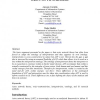Free Online Productivity Tools
i2Speak
i2Symbol
i2OCR
iTex2Img
iWeb2Print
iWeb2Shot
i2Type
iPdf2Split
iPdf2Merge
i2Bopomofo
i2Arabic
i2Style
i2Image
i2PDF
iLatex2Rtf
Sci2ools
ECIS
2003
2003
Actor network theory and after: what's new for IS research?
The basic argument presented in the paper is that actor network theory has often been forced to adopt the ontology of interpretivism and thus suppress its own ontology. Interpretivism is socio-constructivist in nature but ANT is not. Therein lies the gap, a gap that is traversed by using an assumed flexibility of ANT which thus allows it to be used as a lens within the interpretivist ontology. The ontology of interpretvism deems the interpreter to be in a position to construct reality in his/her mind whereas, ANT accentuates that reality is actually constructed by the interplay of more actors (both human and non human) and this reality emerges from this interaction. Therefore for interpretivism, reality is created in the mind and for ANT, reality emerges ‘out there’. These differences in the ontological foundation of ANT and interpretivis must be taken into consideration when ANT is used to inform research in IS. These differences are in fact defining the object of the analysis an...
Related Content
| Added | 31 Oct 2010 |
| Updated | 31 Oct 2010 |
| Type | Conference |
| Year | 2003 |
| Where | ECIS |
| Authors | Antonio Cordella, Maha Shaikh |
Comments (0)

